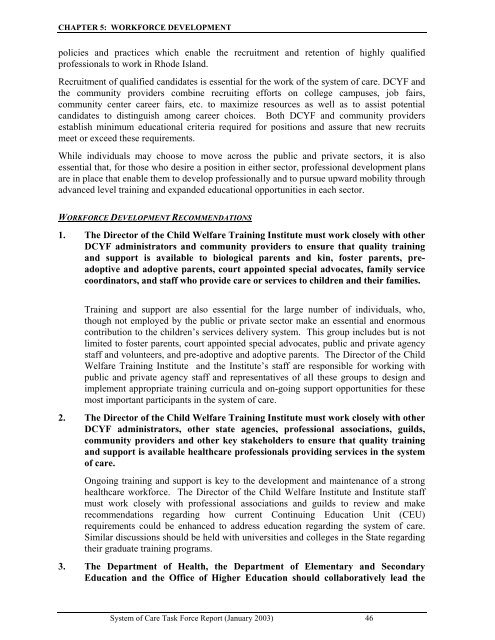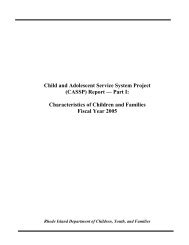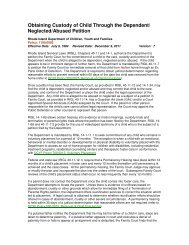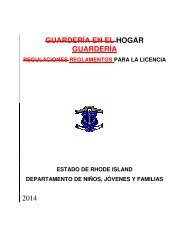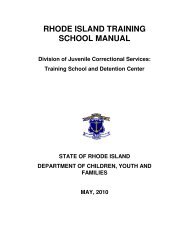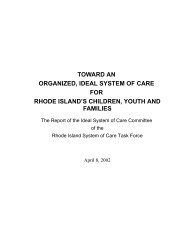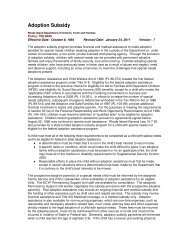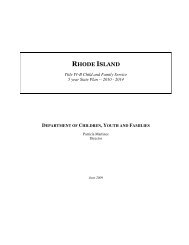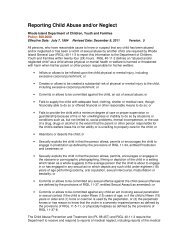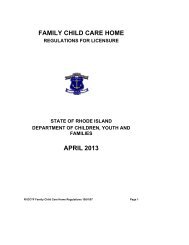Final Report - RI Department of Children, Youth & Families
Final Report - RI Department of Children, Youth & Families
Final Report - RI Department of Children, Youth & Families
You also want an ePaper? Increase the reach of your titles
YUMPU automatically turns print PDFs into web optimized ePapers that Google loves.
CHAPTER 5: WORKFORCE DEVELOPMENT<br />
policies and practices which enable the recruitment and retention <strong>of</strong> highly qualified<br />
pr<strong>of</strong>essionals to work in Rhode Island.<br />
Recruitment <strong>of</strong> qualified candidates is essential for the work <strong>of</strong> the system <strong>of</strong> care. DCYF and<br />
the community providers combine recruiting efforts on college campuses, job fairs,<br />
community center career fairs, etc. to maximize resources as well as to assist potential<br />
candidates to distinguish among career choices. Both DCYF and community providers<br />
establish minimum educational criteria required for positions and assure that new recruits<br />
meet or exceed these requirements.<br />
While individuals may choose to move across the public and private sectors, it is also<br />
essential that, for those who desire a position in either sector, pr<strong>of</strong>essional development plans<br />
are in place that enable them to develop pr<strong>of</strong>essionally and to pursue upward mobility through<br />
advanced level training and expanded educational opportunities in each sector.<br />
WORKFORCE DEVELOPMENT RECOMMENDATIONS<br />
1. The Director <strong>of</strong> the Child Welfare Training Institute must work closely with other<br />
DCYF administrators and community providers to ensure that quality training<br />
and support is available to biological parents and kin, foster parents, preadoptive<br />
and adoptive parents, court appointed special advocates, family service<br />
coordinators, and staff who provide care or services to children and their families.<br />
Training and support are also essential for the large number <strong>of</strong> individuals, who,<br />
though not employed by the public or private sector make an essential and enormous<br />
contribution to the children’s services delivery system. This group includes but is not<br />
limited to foster parents, court appointed special advocates, public and private agency<br />
staff and volunteers, and pre-adoptive and adoptive parents. The Director <strong>of</strong> the Child<br />
Welfare Training Institute and the Institute’s staff are responsible for working with<br />
public and private agency staff and representatives <strong>of</strong> all these groups to design and<br />
implement appropriate training curricula and on-going support opportunities for these<br />
most important participants in the system <strong>of</strong> care.<br />
2. The Director <strong>of</strong> the Child Welfare Training Institute must work closely with other<br />
DCYF administrators, other state agencies, pr<strong>of</strong>essional associations, guilds,<br />
community providers and other key stakeholders to ensure that quality training<br />
and support is available healthcare pr<strong>of</strong>essionals providing services in the system<br />
<strong>of</strong> care.<br />
Ongoing training and support is key to the development and maintenance <strong>of</strong> a strong<br />
healthcare workforce. The Director <strong>of</strong> the Child Welfare Institute and Institute staff<br />
must work closely with pr<strong>of</strong>essional associations and guilds to review and make<br />
recommendations regarding how current Continuing Education Unit (CEU)<br />
requirements could be enhanced to address education regarding the system <strong>of</strong> care.<br />
Similar discussions should be held with universities and colleges in the State regarding<br />
their graduate training programs.<br />
3. The <strong>Department</strong> <strong>of</strong> Health, the <strong>Department</strong> <strong>of</strong> Elementary and Secondary<br />
Education and the Office <strong>of</strong> Higher Education should collaboratively lead the<br />
System <strong>of</strong> Care Task Force <strong>Report</strong> (January 2003) 46


